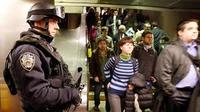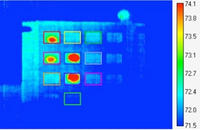-
Detroit police disarm IED found in restaurant
On Sunday, an improvised explosive device was found in the restroom of a Detroit restaurant; police confirmed that it was a bomb and successfully disarmed it
-
-
Expert questions DHS grants for rural communities following 9/11

In the decade since 9/11, the U.S. government has poured more than $1.3 million into the rural community of Ross County, Ohio, which some argue is a waste of federal resources; the funds were ostensibly designed to prevent terrorism, but much of the money has been spent to bolster emergency response capabilities in the event of a major disaster whether it be natural or manmade
-
-
Researchers show facial-reading lie-detector

New lie detecting system records subtle clues that people give off when lying, such as increased blood flow around the eyes, tiny lip movements, or nose twitching; one of the major selling points of such technology would be its use in situations where the person being targeted does not know they are being tested
-
-
NYPD remains on high-alert following 9/11

Officials in New York remain on high-alert following the warning issued by DHS that terrorists might be plotting an attack on the city for the ten-year anniversary of 9/11; NYPD have pulled back the additional security measures put in place for the ten-year anniversary like checkpoints at ports of entry and bridges, but remain on vigilant for a potential bomb attack
-
-
Supreme Court to rule on age of "Big Brother" surveillance

This November the Supreme Court is gearing up to hear a landmark case which will decide how far law enforcement agencies can pry into an individual’s private life; federal judges argue that the use of GPS surveillance by law enforcement is an “Orwellian intrusion” into private life and violate the Fourth Amendment; meanwhile police say GPS tracking is simply a more efficient way to tail a suspect’s car or track their movements, things they can currently do without a warrant
-
-
$1.1 million order for Implant Sciences' portable explosives detectors
Implant Sciences Corporation, a developer of explosives detection technology, recently announced that it had received a $1.1 million order for its portable explosives detection systems; with the latest purchase, Implant Sciences will supply its Quantum Sniffer QS H-150 portable devices to the Middle East for use by critical infrastructure operators
-
-
Counter-terrorism expert: Domestic radicalization "blown out of proportion"
David Schanzer, the director of the Triangle Center on Terrorism and Homeland Security and an associate professor in Public Policy at Duke University, discusses the over inflation of the threat from domestic radicalization, ways to prevent young Muslim Americans from becoming radicalized, and the opportunity that the Arab Spring has presented the United States
-
-
Immigration offenses make Latinos new majority in prisons
A new government report found that Latinos now account for more than half of all felony offenders sentenced this year as a result of immigration offenses; the report released on Tuesday by the U.S. Sentencing Commission revealed that Latinos comprised 50.3 percent of all people sentenced in the first nine months of this fiscal year
-
-
Gait biometrics shows promise
A new biometric technology may soon join retinal scans, voice recognition, and fingerprints as a means to identify individuals: gait pattern biometrics; a method of identifying individuals by the way they walk, saunter, swagger, or sashay has achieved accuracy of about 90 percent in early trials
-
-
Taser-related fatalities raise safety concerns

As police across the United States increasingly turn to Taser guns as a non-lethal weapon, the device’s safety has come under scrutiny following several recent deaths involving Tasers; last week the Fayetteville police department in North Carolina recalled all of its Taser M26 units following the death of a fifty-six year old political activist who died after being stunned by police
-
-
NYPD works with suburban police to stop terrorism
In the ten years since 9/11, the New York City police department (NYPD) has worked to forge closer ties with local police departments in an effort to stop terrorist attacks; “The idea is to add rings of security,” explained chief inspector John Hodges of the Westchester County police; “What’s changed since 9/11 is New York City has learned that people who might want to bring something into New York City will have to infiltrate from somewhere outside,” he said
-
-
Terrahawk showcases its mobile surveillance vehicle
This Thursday Terrahawk, LLC will show off its Mobile Utility Surveillance Tower (MUST) to members of the U.S. House of Representatives and the Senate along with their staffs; with MUST, law enforcement agencies can quickly set up a mobile surveillance tower for emergency response, crowd control, or general surveillance
-
-
Courts uphold rights of citizens to record police in action
The U.S. Court of Appeals for the First Circuit in Boston, in a unanimous decision that many see as a victory for the First Amendment, has recently upheld the right of an attorney to sue police after the police arrested him for using his cell phone to make an audio and video recording of officers conducting an arrest on Boston Common in the fall 2007
-
-
Thermal imaging allows ATM theft from a distance

ATMs’ PINs can be stolen using thermal imaging cameras; when ATM customers press down keys to enter their personal code number, they leave behind residual heat from their fingertips; thermal imaging cameras can catch these numbers
-
-
Facebook could mean the end of undercover ops
Law enforcement officials have begun using Facebook to identify criminals and gather information about their habits, but the technology has the potential to be a double edged sword; an undercover officer could successfully infiltrate a gang only to have their cover blown after their photo is recognized and their Facebook profile carefully scrutinized
-
- All
- Regional
- Water
- Biometrics
- Borders/Immig
- Business
- Cybersecurity
- Detection
- Disasters
- Government
- Infrastructure
- International
- Public health
- Public Safety
- Communication interoperabillity
- Emergency services
- Emergency medical services
- Fire
- First response
- IEDs
- Law Enforcement
- Law Enforcement Technology
- Military technology
- Nonlethal weapons
- Nuclear weapons
- Personal protection equipment
- Police
- Notification /alert systems
- Situational awareness
- Weapons systems
- Sci-Tech
- Sector Reports
- Surveillance
- Transportation
Advertising & Marketing: advertise@newswirepubs.com
Editorial: editor@newswirepubs.com
General: info@newswirepubs.com
2010-2011 © News Wire Publications, LLC News Wire Publications, LLC
220 Old Country Road | Suite 200 | Mineola | New York | 11501
Permissions and Policies
Editorial: editor@newswirepubs.com
General: info@newswirepubs.com
2010-2011 © News Wire Publications, LLC News Wire Publications, LLC
220 Old Country Road | Suite 200 | Mineola | New York | 11501
Permissions and Policies
